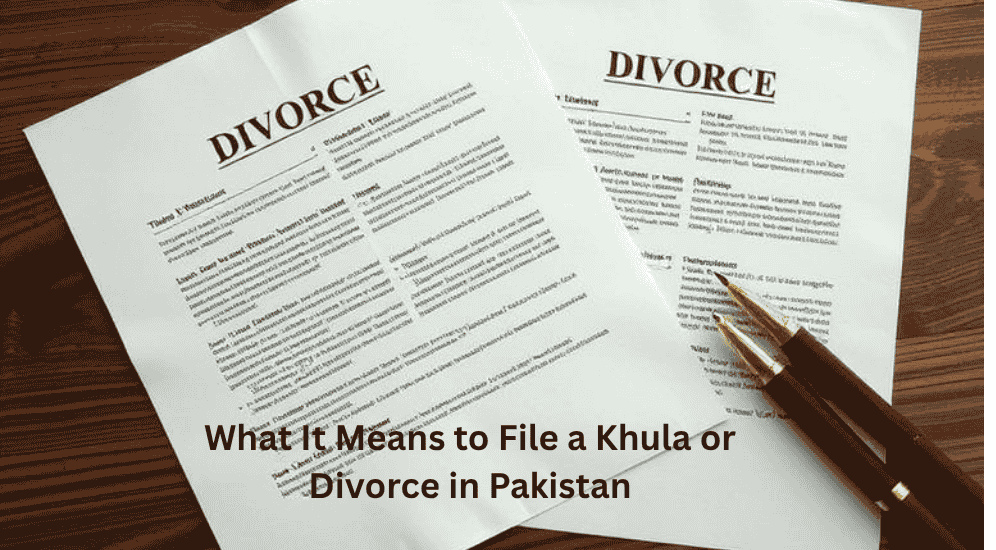Deciding to file for a Khula or divorce in Pakistan is a big step. It’s not just about ending a marriage—it’s about starting a new chapter in your life with confidence and clarity. For women seeking the Khula procedure in Pakistan or men initiating a divorce (Talaq), the process can feel overwhelming. There are legal steps, family courts, and emotional challenges to navigate. As someone who has seen friends and family go through this process in Islamabad, and after speaking with lawyers and women who’ve shared their stories, I know how important it is to have clear, simple information. This guide is here to help you understand every step of filing for Khula or divorce in Pakistan, especially in Islamabad. It’s written in easy words to make sure you feel supported and empowered.
Whether you’re wondering how to file Khula, curious about your rights, or just want to know where to start, this article will answer your questions. It’s packed with practical advice, real-life examples, and tips to make the process smoother. By the end, you’ll feel ready to take control of your journey.
Understanding the Difference Between Khula and Divorce
What is Khula?
Khula is a woman’s right under Islamic law to ask for a divorce through a court. If a husband refuses to end the marriage, a wife can file a Khula petition in a Family court Islamabad. In Khula, a woman may agree to give up some financial rights, like her Haq Mehr (dower), to dissolve the marriage. It’s a way for women to leave a marriage that’s no longer working, whether because of cruelty, neglect, or simply not getting along.
What is Divorce (Talaq)?
Divorce, or Talaq, is when a husband decides to end the marriage. In Islamic law, a man can pronounce Talaq, either by saying it or writing it down. Unlike Khula, Talaq doesn’t always need a court. The husband informs the Union Council, and they handle the process, including trying to bring the couple back together.
Key Legal and Religious Distinctions
The biggest difference is who starts the process. Khula is started by the wife and goes through a court, while Talaq is started by the husband and is mostly handled by the Union Council. In Khula, the wife might give up her dower, but in Talaq, she keeps her financial rights. Both processes follow Islamic rules and Pakistani laws to ensure fairness and give a chance for the couple to rethink their decision.
Legal Grounds for Filing a Khula or Divorce in Pakistan
Common Reasons Cited by Women for Khula
Women divorce rights in Pakistan allow them to file for Khula for many reasons. Some common ones include:
- Cruelty: If the husband is physically or emotionally abusive.
- Neglect: If the husband doesn’t provide money or support for two years.
- Desertion: If the husband leaves and doesn’t contact the wife for four years.
- Infidelity: If the husband cheats or marries someone else without permission.
- Incompatibility: If the couple just can’t live together happily.
From my conversations with women in Islamabad, emotional abuse and lack of financial support are often the top reasons. For example, one friend shared how her husband’s constant insults made her life unbearable, pushing her to file for Khula. Proving these reasons in court can be tough, so having witnesses or evidence, like text messages, is helpful.
Grounds for Men Initiating Divorce (Talaq)
Men don’t need to give a specific reason for Talaq under Islamic law. They can simply decide to end the marriage. However, they must follow legal steps, like notifying the Union Council and waiting for the Iddat period (90 days) to see if the couple can reconcile. Common reasons men mention include not getting along with their wife or personal reasons.
Islamic and Pakistani Legal Framework Governing Khula and Divorce
Islamic Principles on Marriage Dissolution
In Islam, marriage is a sacred bond, but it’s not meant to trap anyone in an unhappy or harmful situation. The Quran allows both Khula and Talaq to end a marriage fairly. Khula gives women the power to leave a marriage if it’s hurting them, while Talaq ensures men follow a proper process. Both include a chance for the couple to talk and try to fix things before the marriage ends.
Pakistani Laws: Family Courts Act & Muslim Family Laws Ordinance
Two main laws in Pakistan guide Khula and divorce:
- Muslim Family Laws Ordinance (1961): This law explains how Khula and Talaq work. For example, Section 8 says a wife can file for Khula without her husband’s agreement.
- Family Courts Act (1964): This law sets up family courts to handle marriage and divorce cases quickly and fairly.
These laws make sure women and men have access to justice and their rights are protected. In Islamabad, family courts are known for being efficient, but the process still takes time and patience.
Procedure to File a Khula in Islamabad
Step-by-Step Process
If you’re wondering how to file Khula in Islamabad, here’s a simple guide:
- Find a Lawyer: Get a family lawyer who knows Khula cases. They’ll help you write your petition.
- File the Petition: Submit your Khula petition to the Family Court where you live or where you got married. Explain why you want Khula.
- Court Sends Notices: The court will notify your husband to come to court.
- Try Reconciliation: The court will ask both of you to talk and see if you can work things out. If not, the case moves forward.
- Show Evidence: Bring proof, like witnesses or documents, to support your reasons for Khula.
- Get the Khula Decree: If the court agrees, they’ll issue a Khula decree, which ends the marriage.
- Go to Union Council: Take the decree to the Union Council to get a Divorce Effectiveness Certificate.
Required Documents
You’ll need these papers:
- Marriage certificate (Nikah Nama)
- Copies of your and your husband’s CNIC
- Proof of your reasons (e.g., messages, photos, or witness statements)
- Special Power of Attorney (if you’re abroad)
Role of Union Council and Family Court
The Family Court decides if Khula is granted, while the Union Council makes sure the divorce is officially recorded. After the court’s decision, the Union Council waits 90 days (Iddat period) before issuing the final certificate. This period gives the couple a last chance to change their minds.
Procedure to File a Divorce (Talaq) in Islamabad
Written Notice of Talaq
To start a Talaq, the husband writes a notice saying he wants a divorce. He sends this to the Union Council and gives a copy to his wife. This follows Section 7 of the Muslim Family Laws Ordinance.
Union Council Reconciliation
The Union Council sets up a small group (arbitration council) to try to help the couple talk and fix their issues. They have 30 days to do this. If the couple can’t agree, the divorce moves forward.
Issuance of Divorce Certificate
After 90 days, if there’s no reconciliation, the Union Council gives a Divorce Effectiveness Certificate. You can use this to update records, like your NADRA ID.
Where to File a Khula or Divorce Case in Islamabad
Family Courts Jurisdiction
For Khula, you file in the Family Court where you live or where your marriage was registered. In Islamabad, the Family court Islamabad handles these cases under the Family Courts Act. They’re designed to be fast and fair, but you still need to be prepared for multiple visits.
Union Council Offices in Islamabad Sectors
Union Councils in Islamabad are spread across the city. Some examples include:
- Sector G-7: Union Council G-7/2, near Sitara Market
- Sector F-6: Union Council F-6/2, close to Super Market
- Sector I-8: Union Council I-8/4, near I-8 Markaz
- Rural Areas: Union Council Bhara Kahu, Tarnol, or Sohan
Call your local Union Council to confirm their address and hours. They’re usually open during regular business hours.
Timeline for Khula and Divorce Process
Duration of Court Proceedings
Khula cases usually take 3 to 6 months in Islamabad. If your husband doesn’t show up or delays things, it might take longer. Talaq is quicker—about 90 days if there’s no conflict.
Reconciliation Periods and Legal Notices
Both Khula and Talaq include a 90-day Iddat period. This is a waiting time to see if the couple can work things out. During this time, the court or Union Council sends notices to make sure both sides know what’s happening.
Rights of Women After Khula or Divorce
Maintenance During Iddat
After Khula or Talaq, a woman has the right to maintenance (basic living expenses) during the 90-day Iddat period. This helps her manage until the divorce is final.
Dowry (Jahez) Return
If you brought dowry (like furniture or jewelry) to the marriage, the court can order your husband to return it. You’ll need to show proof, like a dowry list from your Nikah.
Custody and Child Support Issues
If you have children, the court decides custody based on what’s best for the child. Mothers often get custody of young children (under 7 for boys, puberty for girls), but fathers must pay for their support. These rules come from the Guardian and Wards Act.
Role of the Court and Lawyers in Islamabad
Do You Need a Lawyer?
You don’t have to hire a lawyer, but it’s a smart move. A good lawyer knows the law, helps with paperwork, and speaks for you in court. Without one, you might miss important steps or feel lost.
How Courts Facilitate Reconciliation
Family courts in Islamabad try hard to save marriages. They might ask you and your spouse to meet privately or bring in arbitrators (neutral people) to help you talk. If reconciliation doesn’t work, the court moves forward with the divorce.
Choosing the Right Family Lawyer in Islamabad
Pick a lawyer who specializes in family law and has experience in Islamabad courts. Ask friends or family for recommendations, or check online reviews. A good lawyer listens to you, explains things clearly, and fights for your rights. I once helped a cousin find a lawyer in Islamabad, and we chose someone who was patient and understood her emotional needs—that made a huge difference.
Cost of Filing a Khula or Divorce in Islamabad
Government Fees
Filing a Khula case costs about PKR 250–500 in court fees. Union Council fees for the Divorce Effectiveness Certificate are also low, around PKR 200–300.
Lawyer Fees
Lawyers charge different amounts. A simple Khula case might cost PKR 20,000–50,000, but complicated cases with custody or property issues can go up to PKR 100,000 or more. Shop around and ask for quotes upfront.
Hidden or Miscellaneous Charges
You might face extra costs, like:
- Document attestation (PKR 500–1,000)
- Travel to court or Union Council
- Fees for extra hearings if the case drags on
Budget for these to avoid surprises.
Challenges Faced During the Process
Non-cooperative Spouse
Sometimes, a husband refuses to show up in court or ignores notices. This can slow things down. If this happens, the court might issue an ex-parte decree (a decision without the husband’s input), but it takes time.
Delay Tactics
Some spouses use tricks, like asking for more time or filing counter-cases, to delay the process. This can be frustrating and expensive.
Lack of Legal Awareness
Many women don’t know their rights or how the system works. For example, a neighbor once thought she couldn’t file for Khula without her husband’s permission—she was so relieved to learn she could! Education and legal help are key to overcoming this.
Legal Support Services Available in Islamabad
Legal Aid for Women
If you can’t afford a lawyer, organizations like AGHS Legal Aid Cell or Musawi offer free or low-cost help. They focus on women’s rights and can guide you through Khula or divorce.
NGOs and Helplines
NGOs like Rozan and Bedari provide emotional support and legal advice. The Punjab Commission on the Status of Women (PCSW) has a helpline (0800-00800) for women in need. These groups are a lifeline for many.
Family Law Specialists in Islamabad
Firms like Zahid Law Associates, Khadija Law Associates, and Irfan Mir Halepoto & Associates are well-known in Islamabad for handling family cases. They have experienced lawyers who understand Khula and Talaq.
Common Myths About Khula and Divorce in Pakistan
Here are some myths I’ve heard and the truth behind them:
- Myth: Khula is against Islam or shameful.
Truth: Khula is allowed in Islam and is a woman’s right. It’s about dignity, not shame. - Myth: Women lose all money in Khula.
Truth: You might give up Haq Mehr, but courts can still award maintenance or dowry. - Myth: Talaq happens instantly.
Truth: Talaq takes 90 days to finalize, with a chance for reconciliation.
Case Studies from Islamabad Courts
Let me share two real-life examples (with names changed for privacy). In one case, Ayesha, a 30-year-old from Islamabad, filed for Khula because her husband was emotionally abusive. He didn’t show up in court, so the judge granted an ex-parte Khula decree in five months. Ayesha felt free for the first time in years. In another case, Ali and Sana agreed to a mutual divorce (Mubarat) after realizing they weren’t happy. Their case was simple, and the Union Council issued their certificate in just 90 days. These stories show that while every case is different, the system can work if you’re prepared.
Conclusion: Empowering Individuals with Legal Knowledge
Filing for Khula or divorce in Pakistan is a brave decision. It’s not easy, but with the right information, you can navigate the Khula procedure in Pakistan and come out stronger. Whether you’re in Islamabad or elsewhere, understanding your women divorce rights, the role of Family court Islamabad, and the support available can make all the difference. Don’t be afraid to ask for help—reach out to a lawyer, call a helpline, or talk to someone you trust. You deserve a life of peace and happiness, and this process is your path to getting there.





